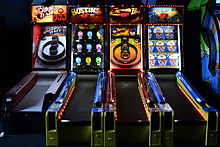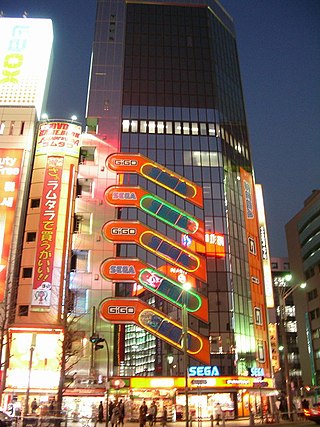
An amusement arcade, also known as a video arcade, amusements, arcade, or penny arcade, is a venue where people play arcade games, including arcade video games, pinball machines, electro-mechanical games, redemption games, merchandisers, or coin-operated billiards or air hockey tables. In some countries, some types of arcades are also legally permitted to provide gambling machines such as slot machines or pachinko machines. Games are usually housed in cabinets.

Arkanoid is a 1986 block breaker arcade game developed and published by Taito. In North America, it was published by Romstar. Controlling a paddle-like craft known as the Vaus, the player is tasked with clearing a formation of colorful blocks by deflecting a ball towards it without letting the ball leave the bottom edge of the playfield. Some blocks contain power-ups that have various effects, such as increasing the length of the Vaus, creating several additional balls, or equipping the Vaus with cannons. Other blocks may be indestructible or require multiple hits to break.

Skee-Ball is an arcade game and one of the first redemption games. It is played by rolling a ball up an inclined lane and over a "ball-hop" hump that jumps the ball into bullseye rings. The object of the game is to collect as many points as possible by having the ball fall into holes in the rings which have progressively increasing point values the higher the ring is.

WMS Industries, Inc. was an American electronic gaming and amusement manufacturer in Enterprise, Nevada. It was merged into Scientific Games in 2016. WMS's predecessor was the Williams Manufacturing Company, founded in 1943 by Harry E. Williams. However, the company that became WMS Industries was formally founded in 1974 as Williams Electronics, Inc.

Sega Sammy Holdings Inc. is a Japanese global holding company and conglomerate formed from the merger of Sega and Sammy Corporation in 2004. Both companies are involved in the amusement industry.
Redemption games are typically arcade games of skill that reward the player proportionally to their score in the game. The reward most often comes in the form of tickets, with more tickets being awarded for higher scores. These tickets can then be redeemed at a central location for prizes. The most inexpensive prizes may require only a small number of tickets to acquire, while the most expensive ones may require several thousand. In general, the amount of money spent to win enough tickets for a given prize will exceed the value of the prize itself. Some redemption games, such as Flamin' Finger, involve elements of chance, which can be set by the operator.

Whac-A-Mole is an arcade game. It was created in 1975 by the amusements manufacturer TOGO in Japan, where it was originally known as Mogura Taiji or Mogura Tataki.

Shopko was a chain of department stores based in Green Bay, Wisconsin. All locations closed on June 23, 2019, with the exception of the Shopko Optical locations, which continue to operate.

An electronic game is a game that uses electronics to create an interactive system with which a player can play. Video games are the most common form today, and for this reason the two terms are often used interchangeably. There are other common forms of electronic games, including handheld electronic games, standalone arcade game systems, and exclusively non-visual products.
Coinslot International is a UK trade magazine that caters for the 'pay-to-play' leisure sector, generally known as 'coin-op' before the widespread introduction of electronic means of payment. It is published weekly with a 'double' issue over the Christmas/New Year period.

Bandai Namco Holdings Inc., commonly known as Bandai Namco and formerly Namco Bandai until 2015, also known as Bandai Namco Group, is a Japanese entertainment holding company founded in 2005 by the merger of Namco and Bandai. The company specializes in toys, video games, arcades, anime, restaurants, and amusement parks. They are also unofficially nicknamed as "Bamco" by some. The conglomerate is made up of:
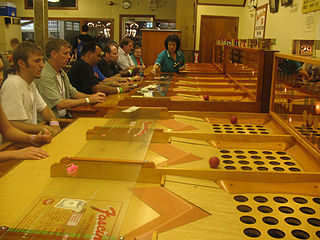
Fascination is a game commonly found in North American amusement parks, boardwalks and arcades. The game is a redemption game, in that prizes are often won for playing the game. The game dates to 1918, with the first location opening at Coney Island, NY. It became popular during the 1920s and spread quickly from coast to coast, as evidenced in pictures of Chutes at the Beach in San Francisco, a park that operated from 1903 - 1928. Over a century later, there are still a handful of locations that are in operation, mostly in the Northeastern US.

A traveling carnival, usually simply called a carnival, travelling funfair or travelling show, is an amusement show that may be made up of amusement rides, food vendors, merchandise vendors, games of chance and skill, thrill acts, and animal acts. A traveling carnival is not set up at a permanent location, like an amusement park or funfair, but is moved from place to place. Its roots are similar to the 19th century circus with both being fitted-up in open fields near or in town and moving to a new location after a period of time. In fact, many carnivals have circuses while others have a clown aesthetic in their decor. Unlike traditional Carnival celebrations, the North American traveling carnival is not tied to a religious observance.

Bandai Namco Entertainment Inc., formerly Bandai Namco Games until 2015, is a Japanese multinational video game publisher, and the video game branch of the wider Bandai Namco Holdings group. Founded in 2006 as Namco Bandai Games Inc., it is the successor to Namco's home and arcade video game business, as well as Bandai's former equivalent division. Development operations were spun off into a new company in 2012, Namco Bandai Studios, now called Bandai Namco Studios.
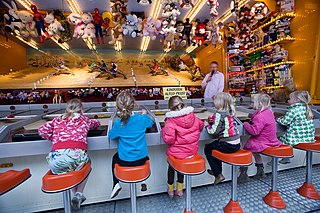
A carnival game is a game of chance or skill that can be seen at a traveling carnival, charity fund raiser, amusement arcade and amusement park, or on a state and county fair midway. They are also commonly played on holidays such as Mardi Gras, Saint Patrick's Day, and Oktoberfest.
Pulaski High School is a public high school in Pulaski, Wisconsin, United States, in Brown County, that serves students in grades 9 through 12. Its mascot is the Red Raider.
Monster Mini Golf is a franchised chain of entertainment centers. The locations feature an indoor, 18-hole glow-in-the-dark mini golf course, video and redemption arcade games, three-dimensional animatronic props, an in-house radio station, party rooms for hosting birthday parties and other special events, as well as laser-tag, laser-maze, and bowling in some of the newer, larger facilities. The parent company, Monster Entertainment, LLC is headquartered in Providence, Rhode Island, United States, and Las Vegas. As of January 2023 the chain has 31 locations, either open or under construction, across the United States and Canada.
Sente Technologies was an arcade game company. Founded as Videa in 1982 by ex-Atari employees Roger Hector, Wendi Allen, and Ed Rotberg, the company was bought by Nolan Bushnell and made a division of his Pizza Time Theatre company in 1983. In 1984 the division was acquired by Bally Midway who continued to operate it until closing it down in 1988. The name Sente, like Atari, is another reference to Bushnell's favorite game, Go and means "having the initiative."
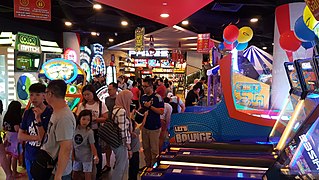
Out-of-home entertainment is a term coined by the amusement industry to collectively refer to experiences at regional attractions like theme parks and waterparks with their thrill rides and slides, and smaller community-based entertainment venues such as family entertainment and cultural venues.

An arcade game or coin-op game is a coin-operated entertainment machine typically installed in public businesses such as restaurants, bars and amusement arcades. Most arcade games are presented as primarily games of skill and include arcade video games, pinball machines, electro-mechanical games, redemption games or merchandisers.

